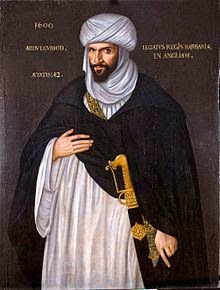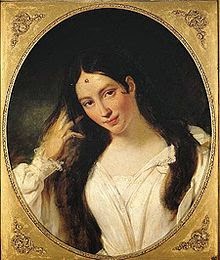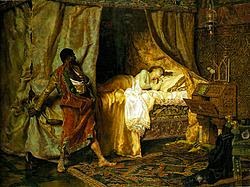“O, beware, my lord, of jealousy;
It is the green-ey’d monster, which doth mock
The meat it feeds on.”
Othello the Moor is lauded over Venice for his help in attempts to rid them of the pesky Turks in their battle over Cyprus. Yet when Othello weds the beautiful Venetian Desdemona in secret, some opinions of his prowess change, notably those of Desdemona’s father. And unbeknownst to Othello, Iago, his third-in-command, is plotting a dastardly revenge for being passed over for promotion, the position being given to Othello’s loyal lieutenant, Cassio. Hence proceeds perhaps the most shocking example of manipulation in literature, as Iago takes possession of Othello’s mind and emotions, like a beast taking possession of its prey, transforming our noble Moor from a honest, straightforward, respected man into an enraged, vengeful monster who believes every evil of his innocent wife, including her unfaithfulness with his second-in-command, Cassio. Othello’s jealousy manages to eclipse anything within our understanding.
 |
| Abd el-Ouahed ben Messaoud ben Mohammed Anoun, Moorish ambassador to Elizabeth I suggest inspiration for Othello source Wikipedia |
Iago reveals that, as well as the injury of being passed over for promotion, he also harbours a suspicion that Othello has been sleeping with his wife, Emilia, who is Desdemona’s lady-in-waiting. There is no proof of this accusation in the play, and it is likely that Iago is expecting people to act with the same lack of integrity and base bestial urges, that he himself would, in the same circumstances.
How does a gentle and admired military leader allow himself to be reduced to a maddened beast, his fury leading him to commit the worst atrocity against a perfectly innocent human being, and one who has loved and supported him through their short marriage? What hidden button inside Othello’s psyche has Iago discovered and pushed, knowing that it will make him snap?
_par_F._Bouchot.jpg) |
| Maria Malibran as Rossini’s Desdemona Françoise Bouchot source Wikipedia |
Certainly there are various issues that come into play and work against Othello. He is used to being a commander, yet is unused to being a husband and obviously, when in love, is out of his depth. Perhaps he sees Desdemona as a possession that he has conquered and, instead of being able to relax in his marriage, he, like a military leader, feels that he must wage battle to keep her. And when difficulties do arise, instead of trying to search out the truth, he acts like a military leader and attempts to “conquer the enemy”. He has insecurities that lead to him being a willing pawn of Iago’s machinations. The jealousy that Iago is able to set aflame within him, corrupts his normal good sense and his actions become intemperate. I certainly have compassion for his state, as I believe these aspects have severely affected his decison-making and emotional state, but, that said, he is still human and he still has the option of choice. He knows right from wrong, yet he decides to allow his emotions to rule and himself to be led down the tragic path of mindless jealousy. In reality, he allows himself to turn into a beast.
 |
| Othello & Desdemona Antonio Muñoz Degrain source Wikipedia |
Shakespeare’s exhibits an uncanny ability to weave endless possibilities into a Gordian knot of drama and draw the reader into his poetic spell. Will we ever know exactly what motivated Othello and his spiral from an honourable man to a madly jealous murderer. Will we ever understand why he believed Iago without any “ocular proof”? What happened to the military commander that must have been used to exhibiting self-control? Do intense emotions subvert our ability to act as a human beings? There are so many avenues to explore and no obvious or set answers.
Of all the characters in the play, my favourite character was Emilia. While she remains surprisingly unaware of the plotting and intrigues of her husband, upon realizing the truth, she becomes the voice of the audience, who has until this point been mute in horror, and satisfyingly spews vile recriminations on the head of Othello.
T.S. Eliot had a different view of the last actions of Othello than many older critics:
“I have always felt that I have never read a more terrible exposure of human weakness — of universal human weakness — than the last great speech of Othello. I am ignorant whether any one else has ever adopted this view, and it may appear subjective and fantastic in the extreme. It is usually taken on its face value, as expressing the greatness in defeat of a noble but erring nature. What Othello seems to me to be doing in making this speech is cheering himself up. He is endeavouring to escape reality, he has ceased to think about Desdemona, and is thinking about himself. Humility is the most difficult of all virtues to achieve; nothing dies harder than the desire to think well of oneself. Othello succeeds in turning himself into a pathetic figure, by adopting an aesthetic rather than a moral attitude, dramatising himself against his environment. He takes in the spectator, but the human motive is primarily to take in himself. I do not believe that any writer has ever exposed this bovarysme, the human will to see things as they are not, more clearly than Shakespeare.”
I read this play as part of a Shakespeare: From the Page to the Stage course that I’m taking online, and it’s definitely moved in among my favourites!
 |
| Laurence Fishburne & Kenneth Branaugh Othello 1995 source Wikipedia |



